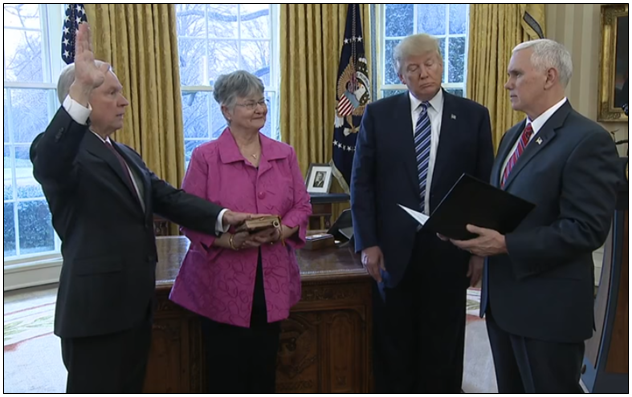One of the most unprecedented parts of the election of President Donald Trump in 2016 was the fact that prior to the election, the Trump campaign — the opposition party — was under active investigation by the Obama administration for being Russian agents.
Falsely, as it turns out. DNC and Hillary Clinton campaign paid-for “intelligence” was used by the FBI to get a Foreign Intelligence Surveillance Act (FISA) warrant against Trump campaign advisor Carter Page in Oct. 2016, which got renewed three times. The last warrant, we are told, expired July 2017 after Special Counsel Robert Mueller was appointed in May 2017.
The accuracy of the dossier, by British ex-spy Christopher Steele, with the monies handled by Fusion GPS, has long been disputed. It had then-Trump lawyer Michael Cohen in Prague meeting Russian agents when he says to this day he was never there. Overall, it alleged that the Trump campaign orchestrated, with Moscow, the hacking of the DNC emails that were published on Wikileaks in July 2016.
That Russia did it, and critically, that Trump helped. That was what the warrant was supposed to help the FBI prove.
The investigation began in 2016, and then, after Trump won the election, was carried over into 2017, and after Trump was sworn in, the investigation persisted.
It was based on a false premise, the President contends, who has consistently called the allegations a hoax. Consider then the ramifications, constitutionally, of the outgoing President Barack Obama ordering, in essence, a phony investigation to continue when the new President Trump was sworn in.
The President under the vesting clause of Article II, Section 1 states, “The Executive Power shall be vested in a President of the United States of America.” It’s up to presidents, ultimately, to execute the laws the United States, to order investigations and to see to prosecutions. That was the power Obama — and his appointees — were acting under when the Russia collusion investigation was ordered, whenever that was.
It’s also under the Article II, Section 2 that the President gets to choose the executive officers of the federal government subject to Senate confirmation: “[The President] shall nominate, and by and with the Advice and Consent of the Senate, shall appoint Ambassadors, other public Ministers and Consuls, Judges of the supreme Court, and all other Officers of the United States, whose Appointments are not herein otherwise provided for, and which shall be established by Law…”
So, you had an investigation, led by Obama’s appointee to the FBI director, James Comey, into Trump, on his way into office. What happens?
If the investigation was based on a false premise and was politically motivated, that Trump was a Russian agent when he wasn’t, can’t the President just end the investigation? What about fire Comey for lying to the President about the investigation? This was a probe launched in essence by Trump’s political opponents as a dirty trick in an election year. Is he just supposed to remain in the carefully laid trap for him? How is that justice?
Officially, Comey was fired for his handling of the Hillary Clinton classified email on a private server investigation, but even if he was fired for investigating Trump for Russia collusion after telling the President he wasn’t and which the President denies, why not fire Comey for leading a false investigation? Trump certainly had the legal authority to remove Comey.
Former Attorney General Jeff Sessions recused himself early in 2017 from the Russia probe. He was apparently determined to let the Justice Department finish what it had started in 2016. Soon, Comey was fired leading to the appointment by Deputy Attorney General Rod Rosenstein of Mueller in May 2017, this time to presumably investigate Comey’s firing as potential obstruction of justice.
It was an unprecedented situation. Of course President Trump under the Constitution gets to decide who the FBI director is, and so he did. Christopher Wray was appointed and confirmed by the Senate, yet, the presumption on the part of the President’s critics was and is that, in fact, he had no power to depose Comey even though under the law, the FBI director serves at the pleasure of the President.
Fast forward to Nov. 7, 2018, and former Attorney General Jeff Sessions has lost his job. Trump wanted a new Attorney General, and why not? Presidents get to choose their Attorneys General, even in the acting role. Special Counsel Robert Mueller cannot rewrite the Constitution or federal law.
5 U.S. Code § 3345(a)(3) provides that “the President (and only the President) may direct an officer or employee of such Executive agency to perform the functions and duties of the vacant office temporarily in an acting capacity… [who has] served in a position in such agency for not less than 90 days…”
Now, it’s up to acting Attorney General Matthew Whitaker to stand in at the Justice Department in lieu of a permanent replacement for Sessions. That’s not obstruction either.
Nobody has prevented Mueller from conducting his probe. Whether he exceeded his authority or whether Rosenstein afforded too much discretion, however, are concerns that Whitaker would be well within his powers to address. Mueller does not get a free pass from oversight, no matter how the Russia collusion investigation came into being. To suggest otherwise is to suggest that outgoing presidents can order investigations into their successors and Deputy Attorneys General get to make appointments that are functionally more powerful than the President.
The real question is whether this unfortunate witch hunt of the opposition party by the outgoing, lame duck administration should have ever been dignified after Trump was sworn in. Sessions, in essence, deferred to the Justice Department’s determination to investigate Trump. The recusal was all encompassing for anything that had happened during the election. Once it was clear the investigation might have been based on false information, Sessions had every opportunity to clarify the scope of his recusal and rein it in. He didn’t.
Because the basis for the investigation still matters. There’s a thing called probable cause, under the Fourth Amendment, that warrants are only supposed to issued when the condition. Comey gambled everything on the dossier. It was wrong. Trump didn’t help Russia hack the DNC.
Sometimes, when you gamble, you’re supposed to lose.
Specifically, if Mueller cannot prove that Carter Page, the subject of the FISA warrant, and Paul Manafort and Michael Cohen, all named in the dossier, were responsible for the DNC hack and publication of emails on Wikileaks, then Trump will have been right all along. It was a hoax. Replacing the executive officers who legitimized or stood by while this spying on the opposition party in the middle of an election and then the administration is the beginning, not the end of how the nation begins to clean up this mess.
The acting Attorney General and his successor should look into this. If the Justice Department initiated a political investigation into the opposition party in an election year on fraudulent grounds, let’s fix it, not hide it.
Robert Romano is the Vice President of Public Policy at Americans for Limited Government.








